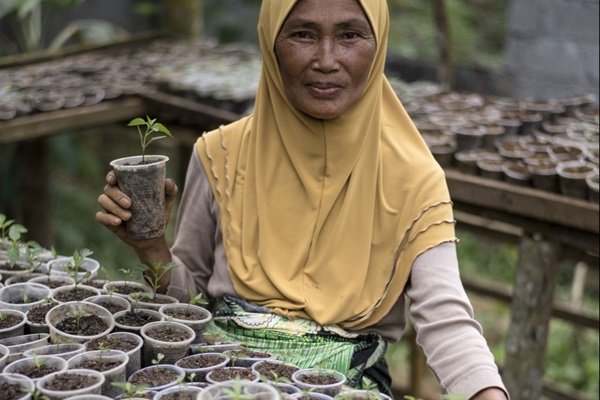The role that small-scale producers play in agrifood systems, and their transformation, is often not fully appreciated. Yet, small-scale producers are frequently the mainspring of agrifood systems, particularly those in marginal and threatened environments, often in low- and middle-income countries, where climate change, among other destructive forces, is having a disproportionate effect. Small-scale producers contribute substantially to many national economies and comprise many groups, including women, the young and Indigenous Peoples, whose existence and contributions are habitually undervalued. Despite their importance, small-scale producers are frequently unable to compete successfully with well-resourced large-scale producers. This ultimately generates social, environmental and economic inequalities.

Madagascar - A fisherman carrying his nets and his daughter carrying the paddle and the spear along the beach on their way home at the end of the day. © FAO/Alexander Joe
FAO draws attention to the constraints faced by small-scale producers
Considering these issues, FAO-UNDP, in partnership with IWMI (The International Water Management Institute), has published the review, Small-scale producers in sustainable agrifood systems transformation.
The review characterizes the precarious situation of small-scale producers. It attempts to highlight the hazards they face and how, given adequate support and recognition, they can contribute to securing sustainable agrifood systems, and to the transformation of agricultural production so that the expectations for a world free from hunger might be met.
A focus on small-scale production can help move towards agrifood systems that are more in tune with ecologies and needs and can respond to disruptions and change. Small-scale producers will be key to the sustainable transformation of agrifood systems and to achieving 2030 Agenda expectations.
Small-scale producers participate in agrifood systems that can be less productive than large-scale production systems, but which nonetheless are often more resilient to climate change and environmental pressures. The nature of small-scale production often allows accommodation of ecologically restorative production, and such systems can represent key sources of agrobiodiversity and diverse knowledge systems.

Philippines - Maira Palindok removing weeds at her Food Security Convergence Nursery at Barangay Guimba, Marawi City, Lanao del Sur. © Noel Celis
.tmb-th600x400.jpg?Culture=en&sfvrsn=1a8938ff_1)
Kenya - Hassan Farah, 60, feeds his cow with feeds provided by FAO. © FAO/Patrick Meinhardt
Understanding small-scale producers
This review provides information that helps improve understanding of small-scale producers and the contributions they make to social systems and agricultural economies. For example, small-scale production is very labour-dependent, frequently family-based, and is an important creator of employment. Small-scale production systems such as fisheries and livestock rearing are particularly significant for poorer households and have the potential to stimulate the creation and distribution of wealth in rural areas. Economic growth is often tied to small-scale production and plays an important role in many national efforts to reduce poverty.
The review also provides a thorough account of the constraints experienced by small-scale producers and how those constraints might be overcome to maximize the contributions small-scale production can make to improved welfare and well-being of rural populations around the globe. Recommendations and suggestions are made for realizing the largely untapped potential of small-scale producers to contribute to sustainable agrifood systems transformation. The benefits of moving small-scale production from a marginal to a central position are illustrated, indicating how small-scale producers can be instrumental in transforming the prevailing industrial agriculture paradigm into one that ensures food security and nutrition for all.
A major constraint to small-scale production is inadequate and unequal access, individually and collectively, to assets such as land and water resources, forests and fisheries. This is further exacerbated by vulnerability to climate and environmental change. Suggestions are made in the review as to how this might be addressed and corrected for.
Supporting small-scale producers
Small-scale production is not always adequately supported by advisory services or agricultural research and formal educational programmes. There is a need to democratize power asymmetries in knowledge provision, and to acknowledge the diverse forms of local knowledge of small-scale producers. Digital technologies have shown promise in resolving some of these challenges. However, digital divides endure, alongside concerns related to the distribution of costs and benefits to small-scale producers in the types of agrifood systems fostered by digital innovations.
Expanding the potential of small-scale producers for sustainable agrifood systems transformation requires policies, institutions, legislation and investments that maximize the synergies of small-scale production and minimize trade-offs among the social, economic and environmental dimensions of agrifood systems.
“There needs to be support for creation and exchange of knowledge and innovation for sustainable small-scale production in order to have a meaningful impact”, as emphasized by Mona Chaya, Special Advisor in the Office of the Chief Scientist of FAO. The increasing specialization and simplification of agrifood systems and centralization of decision-making power is unlikely to coincide with resolving the challenges currently faced. Addressing them requires urgent and bold transformations, focussing on the millions of small-scale producers around the globe. Small-scale producers in sustainable agrifood systems transformation represents an attempt to draw attention to the significance and potential of small-scale producers in the transformation of agrifood systems.
Learn more

Publication
Small-scale producers in sustainable agrifood systems transformation
This paper analyzes the diversity of small-scale producers and demonstrates how understanding small-scale production can have consequences for how policies and investments are directed and how they impact small-scale producer livelihoods.
The diverse roles and functions of small-scale production are presented as being essential to realizing sustainable agrifood systems transformations and respecting its social, environmental and economic dimensions.
